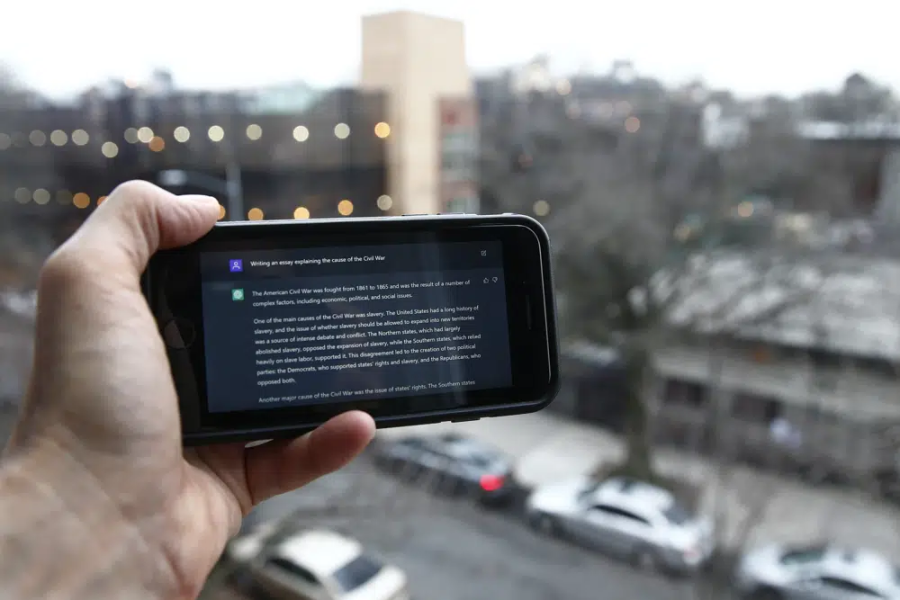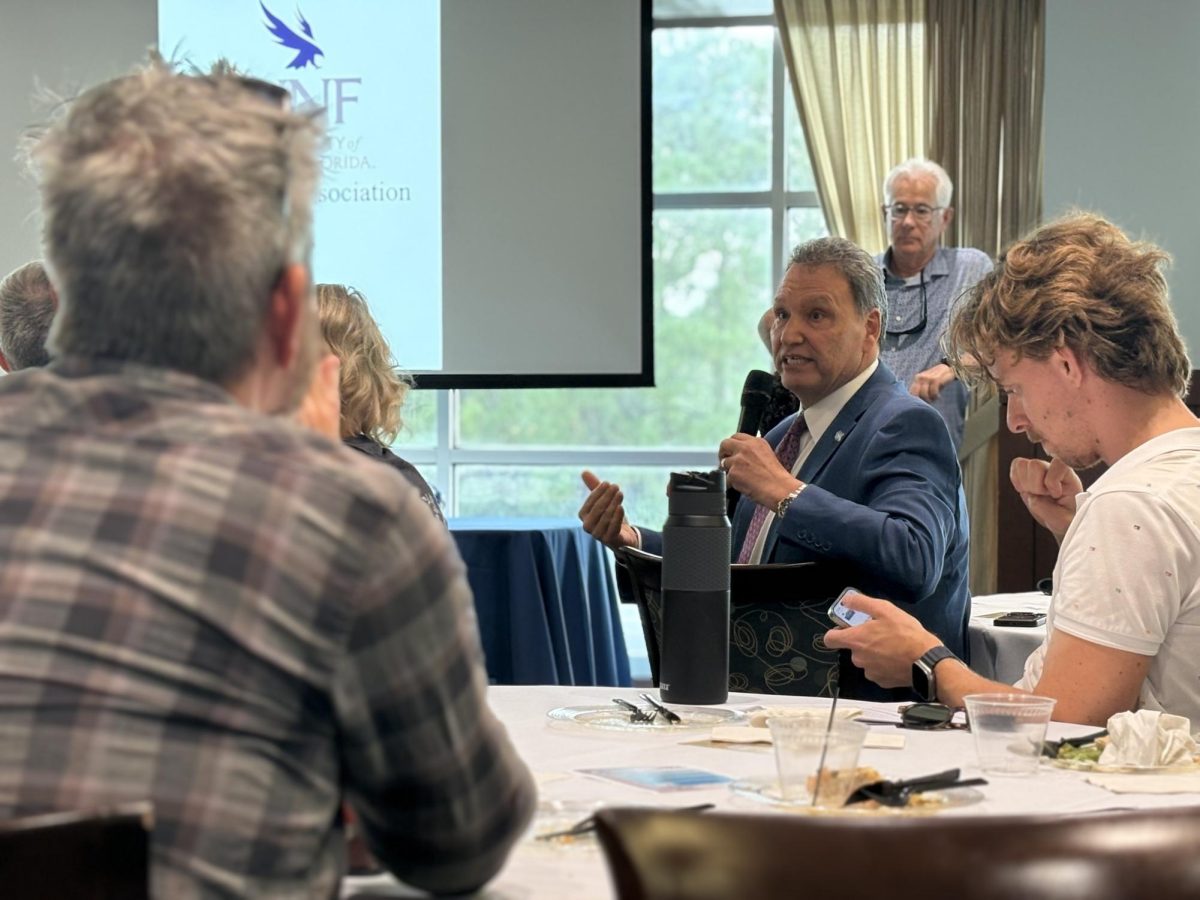With just a few lifts of a finger and even less amount of time, new artificial intelligence (AI) technology has given millions of Internet users the ability to receive information on any given topic or even create a poem about itself—but that’s not even the tip of what the ChatGPT iceberg can do.
ChatGPT is a part of a new set of AI technologies that uses a large language model to generate conversational text to produce anything from simple answers to elaborate essays, scripts, poems, language code and much more.
“ChatGPT was trained using Wikipedia and many, many program rappels,” Dr. Xudong Liu, a University of North Florida (UNF) professor, said. “It’s not online, though, so if you ask it to predict the weather for tomorrow, it won’t work.”
He explained that ChatGPT is a chatbot powered by GPT—Generated Pre-training Transformer. Dr. Liu is a professor in UNF’s School of Computing and teaches a spectrum of courses, including introductory to Artificial Intelligence and machine learning.
Users can type in a question or prompt—as vague or specific as they want—and receive an originally generated answer within seconds. The responses mimic a human-like conversation and can even be instructed to be humorous, sentimental or in a specific rhetoric or tone.
Chat GPT’s place in education
The impressive and immense power this technology holds is a double-edged sword as its uses have proved problematic—especially in a school atmosphere. Because ChatGPT can generate original text on any given topic, there have been concerns that students can use this tool to turn in AI-generated work and claim it as their own.
Dr. Sherif Elfayoumy explained that ChatGPT could be a useful tool if it’s used for the right purposes, but it’s not to encourage cheating or taking credit where it isn’t deserved. Dr. Sherif Elfayoumy is the Director of UNF’s School of Computing and a professor of computer science teaching a variety of courses.
In an attempt to prevent this type of plagiarism, school officials in New York City have started blocking the site from its schools’ computers and networks—but of course, this doesn’t stop students from using the website on their own devices.

“When you get a point where a machine can generate a conversation that you won’t be able to tell whether it is a human or machine, that is the true definition of artificial intelligence,” Dr. Elfayoumy explained.
While detecting AI-generated text has not been well introduced or implemented yet, Dr. Liu explained that there had been an effort to begin this type of technology.
Dr. Liu explained that efforts are being made to create technology that can detect AI-generated text, including a tool called GPTZero, a model developed by undergraduate students at Princeton University.
“It claims that it can detect whether a piece of paragraph is generated by a machine or not, with a very acceptable confidence,” Dr. Liu said. “But it’s a good sign to see efforts on the other side of it.”
He also explained that some professional computing conferences, like the International Conference on Machine Learning (ICML), have explicitly added rules into their guidelines against using ChatGPT-generated text for submissions.
ChatGPT was developed by the San Francisco-based startup company, OpenAI and was launched on Nov. 30, 2022. One part of what makes ChatGPT different from previously designed chatbot tools created by OpenAI, is that it is free for the public and anyone with Internet access to use.
The power and potential of this technology have been recognized by more than merely interested individuals. Microsoft invested $1 billion in OpenAI in 2019 and has since invested another $2 billion, according to The New York Times.
As far as the accuracy of ChatGPT goes, however, Dr. Elfayoumy said it’s in the eyes of the beholder.
“I’m not aware of any technology that would produce a 100% accurate answer all of the time,” he said. “We always have to take things with a pinch of salt.”
Technology is always changing, advancing and failing. Dr. Elfayoumy explained that there could even be attempts in the future to expose the tool to wrong information that would lead to inaccurate information being produced.
With the help of ChatGPT, that frustrating writer’s block may be cured by asking the chatbot to help with coming up with a topic or even rewriting a sentence that just doesn’t sound exactly right.
The possibilities of what ChatGPT can generate are endless. For example, you can ask it to create a poem about cats, and it will appear in seconds. Then you can ask it to make that poem sound scary or in the style of Shakespeare—the words are typed out in front of your eyes in a matter of seconds.
Take this poem, for example, which Spinnaker asked ChatGPT to create about itself:
“ChatGPT, a model so grand,
Trained on words, both near and far-off land,
It speaks in tongues, with fluid ease,
A conversation partner, if you please.
From questions deep, to tales untold,
It speaks with grace, both young and old,
A master of language, it does excel,
With ChatGPT, you’ll never be at a loss for words to tell.
With each fine-tuned task, it does excel,
Generating text that’s sure to repel,
All doubts of AI’s true worth,
ChatGPT, a model, of unparalleled worth.”
Undoubtedly, this technology can do amazing things and advance learning in unimaginable ways. But people don’t always use tools how they’re intended, and thus trepidation occurs.
While the future of ChatGPT and its role in schools or education is unclear, cheating will almost never be tolerated and the consequences of plagiarism are severe.
When using ChatGPT for what it’s intended to do, the possibilities are seemingly endless… and fascinating. If you’re interested in learning more about a topic or need help rewording a confusing sentence, technology can be your friend. However, it’s important to not cross that boundary— using tools for additional help, not replacing what your mind can already do.
___
For more information or news tips, or if you see an error in this story or have any compliments or concerns, contact editor@unfspinnaker.com.
















